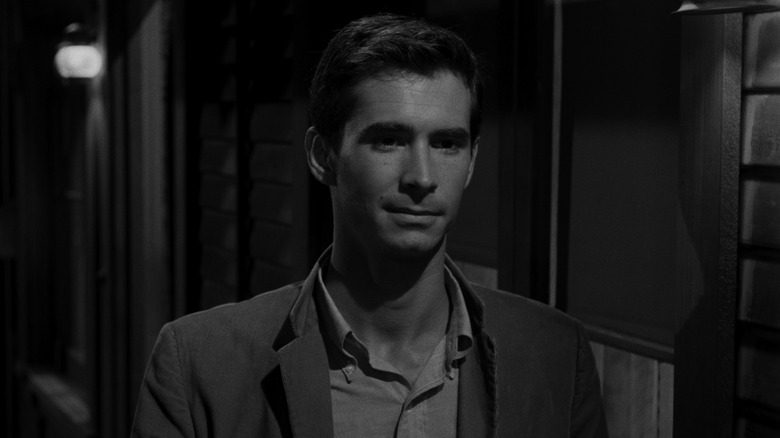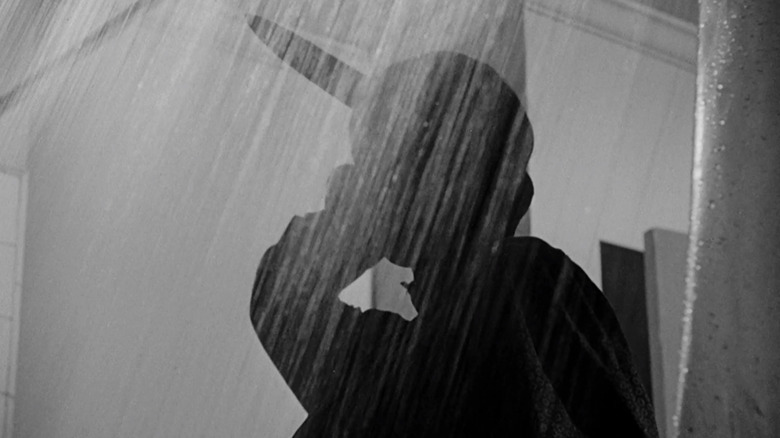Alfred Hitchcock Never Saw Psycho As A Particularly 'Serious' Film
"Psycho" has a reputation for being an unusually sophisticated thriller, with critical and academic sources and even other films such as the 2012 biopic "Hitchcock" playing up its import in Alfred Hitchcock's career — and its legacy in Hollywood history. The 1960 classic starring Anthony Perkins and Janet Leigh was the highest-ranking Hitchcock feature on the American Film Institute's original 1997 list of the 100 greatest American movies of all time, and respondents to our own 2022 poll voted it his best film as well.
"Vertigo," however, surpassed "Psycho" in the AFI's 10th anniversary list, and it actually topped the British Film Institute's once-a-decade poll in 2012. And Hitchcock himself didn't necessarily see "Psycho" as a film that was meant to be all that serious in tone. In the book "Alfred Hitchcock: Interviews," edited by Sidney Gottlieb, he was quoted as saying:
"You have to remember that 'Psycho' is a film made with quite a sense of amusement on my part. To me it's a fun picture. The process through which we take the audience, you see, it's rather like taking them through the haunted house at the fairground or the roller-coaster, you know. After all it stands to reason that if one were seriously doing the 'Psycho' story, it would be a case history. You would never present it in forms of mystery or the juxtaposition of characters, as they were placed in the film. They were all designed in a certain way to create this audience emotion. Probably the real 'Psycho' story wouldn't have been emotional at all; it would have been terribly clinical."
'You must be honest about it'
After she checks into the Bates Motel, Janet Leigh's bait-and-switch protagonist, Marion Crane, gives way to the eponymous Norman Bates, who was inspired by real-life serial killer Ed Gein. When Hitchcock talks about how a more serious version of "Psycho" would have been a "clinical" case history, it brings to mind David Fincher projects like "Mindhunter" and "Zodiac," which were based on real events and showed a progression away from the heightened, fictional, sin-themed killings in Fincher's earlier film "Seven."
Critics viewing "Psycho" through a modern lens have argued that by sensationalizing Bates as a cross-dressing killer obsessed with his dead mother, the movie helped perpetuate transphobic stereotypes other movies like "The Silence of the Lambs" would carry forward. Off-screen, Anthony Perkins was gay at a time when society was much less accepting. At one point in his life, he even went through conversion therapy.
Hitchcock's interviewer pointed out that there's a moment where Bates swings his hips like his mother while walking upstairs, and that the director didn't seem to put much stock in the psychiatrist who comes in at the end to bloviate about Bates' condition. However, while Hitchcock consciously set out to entertain audiences with "Psycho," he was also serving up what he believed to be an honest film at the time. He concluded:
"I'm a great believer in making sure that if people see the film a second time they don't feel cheated. That is a must. You must be honest about it and not merely keep things away from an audience. I'd call that cheating. You should never do that. ... You might as well say the basic clue [to Bates dressing up as his mother] was in the feminine nature of the character altogether."

